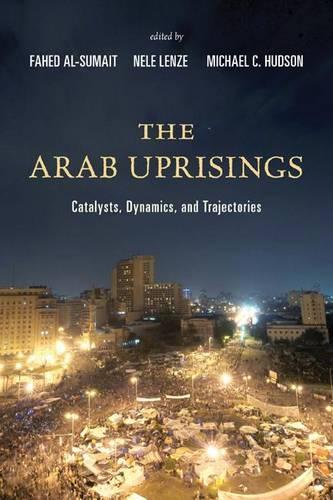
The Arab Uprisings: Catalysts, Dynamics, and Trajectories
(Paperback)
Available Formats
Publishing Details
The Arab Uprisings: Catalysts, Dynamics, and Trajectories
By (Author) Fahed Al-Sumait
Edited by Nele Lenze
Edited by Michael C. Hudson
Bloomsbury Publishing PLC
Rowman & Littlefield Publishers
29th October 2014
United States
Classifications
Tertiary Education
Non Fiction
International relations
320.956
Physical Properties
Paperback
322
Width 153mm, Height 227mm, Spine 25mm
481g
Description
The uprisings of 2011 have radically altered the political, economic, and social landscapes of the Middle East and North Africa. A clearer view of the recent past now provides greater perspectives on the causes and the consequences of these events. This collection of essays challenges the common tendency of applying the dominant frame of Arab Spring to explain contemporary politics of the Middle East. Numerous debates about the utility of the Arab Spring metaphor already exist, contesting such issues as its foreign origins or its temporal and optimistic implications. It further has the negative and significant side effect of implying a singularity to these events in a manner that often defies the varied conditions on the ground. This is why the term Arab Uprisings is used here as the organizing frame to address numerous socio-cultural, economic, political, experiential, and communicative aspects of the uprisings. This text is organized around three themes: origins, experiences, and trajectories. The first section addresses catalyzing factors that help explain the emergence of the uprisings from various political, economic, and socio-cultural perspectives. The second section examines the functions and responses of diverse people, institutions, and ideologies during the initial years of the uprisings. It includes an in-depth case study on womens changing political situation in the catalyzing country of Tunisia, as well as discussions about the roles of political Islam, new mass media, and social networks in these rapidly changing contexts. The third section discusses cross-national implications and the multitude of repercussion the uprisings are having on the global system. Using an interdisciplinary approach with contrasting theoretical and methodological orientations, the global experts who contributed the chapters explore various theoretical approaches, juxtaposing them with comparative surveys and in-depth case studies. They show that after the initial euphoria (or dread) that surrounded the uprisings, a transitional and transformative period in the Middle East has come that requires thorough observation and analysis.
Reviews
The contributors to this excellent volume treat the tumultuous politics of the contemporary Arab world in exactly the way it should be treated: from multi-disciplinary perspectives and with a long view that minimizes the dangers of instant analysis based on current events. Rejecting monocausal explanations, this theoretically-rich collection illustrates the value of adopting a variety of analytical approaches to catalysts, dynamics and political trajectories alike. It is strongly recommended to anyone wishing to gain greater insight into the region and where it might be headed. -- Rex Brynen, Department of Political Science, McGill University
The Arab uprisings have not generated a linear process of transition to democracy. Much strife and uncertainty remain, as the authors show. After reading this book, however, nobody will doubt that the changes taking place are profound and irreversible, and that the Arab world will never be the same. -- Marina Ottaway, the Woodrow Wilson Center
Author Bio
Editors: Michael Hudson is director of the Middle East Institute, professor of Political Science at the National University of Singapore, and Professor Emeritus at Georgetown University, where he served as Director of the Center for Contemporary Arab Studies Fahed Al-Sumait is department chair and assistant professor of communication at the Gulf University for Science and Technology in Kuwait. He is a founding member of the Association for Gulf and Arabian Peninsula Studies through the Middle East Studies Association. Nele Lenze is Research Fellow at the Middle East Institute, National University of Singapore. Contributors: Lars Berger, Associate Professor in International Security, University of Leeds, UK. Researcher at the Moshe Dayan Centre for Middle Eastern and African Studies in Tel Aviv, and the King Faisal Centre for Islamic Research and Studies in Riyadh. Mark Farha, Assistant Professor of Government at Georgetown University School of Foreign Service in Doha, Qatar. Nouri Gana, Associate Professor of Comparative Literature and Near Eastern Languages and Cultures at the University of California, Los Angeles. James Gelvin, Professor of Modern Middle Eastern History at the University of California, Los Angeles. Raymond Hinnebusch, Professor of International Relations and Middle East Studies and Director of the Centre for Syrian Studies, University of St. Andrews. Rami Khouri, Director of Issam Fares Institute for Public Policy and International Affairs at the American University of Beirut. Lilia Labidi, former Minister of Womens Affairs in the Tunisian Government of National Unity. Visiting Research Professor at the Middle East Institute, National University of Singapore. Anton Minkov, Defence Scientist / Strategic Analyst with the Centre for Operational Research and Analysis, part of Defence Research & Development, Government of Canada. Ergun zbudun, Professor of Political Science and Constitutional Law, Bilkent University, Ankara, Turkey. Larbi Sadiki, Tunisian writer and senior lecturer in the Politics Department at the University of Exeter, UK. Peter Tikuisis, Senior Defence Scientist at Defence Research and Development, Government of Canada Silvana Toska, visiting scholar at Harvard University.
